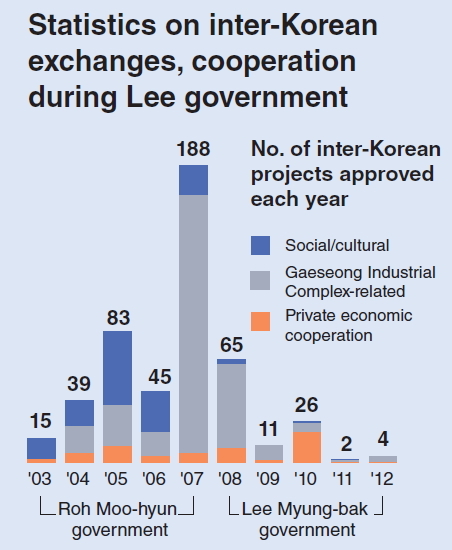Inter-Korean exchanges drop sharply under Lee
Experts call for Seoul’s active efforts to engage North Korea
By Korea HeraldPublished : Jan. 18, 2013 - 19:41
People-to-people exchanges between the two Koreas have been drastically reduced during the Lee Myung-bak government’s five-year term, government data showed Friday.
Seoul officials attributed the decrease to a series of North Korean provocations including the two attacks in 2010 that killed 50 South Koreans. But some criticized the government for its “inflexible” policy toward the North.
The number of North Koreans who visited the South over the last five years was 724, about one-sixth of the figure recorded during the previous administration, according to the data from the Unification Ministry. The number recorded last year was zero for the first time in 14 years.


North Koreans usually come to the South to attend social, religious and sports events such as the International Association of Athletics Federations’ World Championships, which was held in Daegu in 2011.
The number of South Koreans who met their separated families in the North plunged to 1,774, a sharp decrease from 14,600 recorded during the former government’s term, the data showed.
“The figure is the result of Seoul’s stern policy pressuring the North. Of course, Pyongyang’s provocations such as the shelling of Yeonpyeongdo Island contributed to that,” said Kim Yong-hyun, North Korea expert at Dongguk University.
“The next president should be more active in revitalizing bilateral exchanges in the social and cultural sectors, and bolstering humanitarian assistance so that they could help unravel the political standoff between the two governments.”
The total number of North and South Korean people who traveled to each other’s countries was around 664,000, a large increase compared with around 392,000 recorded during the former government.
But most of the people that make up the figure are South Koreans, a large portion of who are those working at the inter-Korean industrial complex in the North’s border city of Gaeseong.
The complex has been exempt from Seoul’s ban on economic cooperation and exchanges with Pyongyang. The so-called “May 24 measures” were imposed after the North torpedoed the South Korean corvette Cheonan in March 2010.
Thanks to the exemption, the total volume of two-way trade through the complex from 2008-2012 jumped around sevenfold to $6.69 billion. During the previous government, it was around $957 million. The complex began its operations in 2004.
According to the ministry’s data, the number of inter-Korean cooperation projects Seoul signed was 108 while the figure for the previous government was 370. Among the projects, the number of those related to social and cultural exchanges was only five while the figure under the Roh government was 121.
Amid inter-Korean tension, President-elect Park Geun-hye has pledged to seek to build trust with the North and have more dialogue to resolve pending bilateral issues. But she maintains that trust-building efforts will be made based on a strong deterrence.
By Song Sang-ho (sshluck@heraldcorp.com)
Seoul officials attributed the decrease to a series of North Korean provocations including the two attacks in 2010 that killed 50 South Koreans. But some criticized the government for its “inflexible” policy toward the North.
The number of North Koreans who visited the South over the last five years was 724, about one-sixth of the figure recorded during the previous administration, according to the data from the Unification Ministry. The number recorded last year was zero for the first time in 14 years.


North Koreans usually come to the South to attend social, religious and sports events such as the International Association of Athletics Federations’ World Championships, which was held in Daegu in 2011.
The number of South Koreans who met their separated families in the North plunged to 1,774, a sharp decrease from 14,600 recorded during the former government’s term, the data showed.
“The figure is the result of Seoul’s stern policy pressuring the North. Of course, Pyongyang’s provocations such as the shelling of Yeonpyeongdo Island contributed to that,” said Kim Yong-hyun, North Korea expert at Dongguk University.
“The next president should be more active in revitalizing bilateral exchanges in the social and cultural sectors, and bolstering humanitarian assistance so that they could help unravel the political standoff between the two governments.”
The total number of North and South Korean people who traveled to each other’s countries was around 664,000, a large increase compared with around 392,000 recorded during the former government.
But most of the people that make up the figure are South Koreans, a large portion of who are those working at the inter-Korean industrial complex in the North’s border city of Gaeseong.
The complex has been exempt from Seoul’s ban on economic cooperation and exchanges with Pyongyang. The so-called “May 24 measures” were imposed after the North torpedoed the South Korean corvette Cheonan in March 2010.
Thanks to the exemption, the total volume of two-way trade through the complex from 2008-2012 jumped around sevenfold to $6.69 billion. During the previous government, it was around $957 million. The complex began its operations in 2004.
According to the ministry’s data, the number of inter-Korean cooperation projects Seoul signed was 108 while the figure for the previous government was 370. Among the projects, the number of those related to social and cultural exchanges was only five while the figure under the Roh government was 121.
Amid inter-Korean tension, President-elect Park Geun-hye has pledged to seek to build trust with the North and have more dialogue to resolve pending bilateral issues. But she maintains that trust-building efforts will be made based on a strong deterrence.
By Song Sang-ho (sshluck@heraldcorp.com)
-
Articles by Korea Herald








![[Weekender] Geeks have never been so chic in Korea](http://res.heraldm.com/phpwas/restmb_idxmake.php?idx=644&simg=/content/image/2024/05/16/20240516050845_0.jpg&u=)









![[Herald Interview] Byun Yo-han's 'unlikable' character is result of calculated acting](http://res.heraldm.com/phpwas/restmb_idxmake.php?idx=652&simg=/content/image/2024/05/16/20240516050855_0.jpg&u=)
